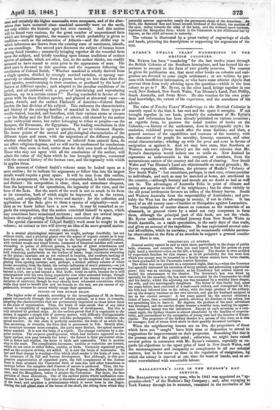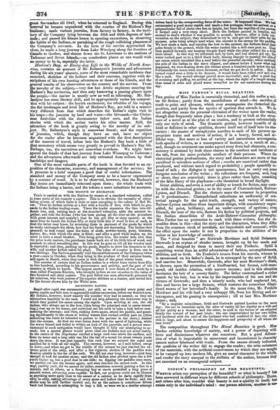BALLANTYNE'S LIFE IN THE HUDSON'S BAY SERVICE.
Mn. ItusairrrNn is a young man, who in 1841 was appointed an "ap- prentice-clerk" of the Hudson's iay Company ; and, after voyaging to York Factory through ice in summer, remained in the territories of the
rat fur-traders till 1847, wben'he returned to England. During this mterval he became acquainted with the routine of the Hudson's Bay business; made various jonrnie. a, from factory to factory, in the terri- tory of the Company lying between the 50th and 60th degrees of lati- tude; and passed his leisure hours in sporting excursions, in observing the habits of the Indians, or partaking of the rough rollicking pleasures of the Company's servants. Aa the term of his service approached its close, he made a long journey-from Lake -Winnipeg along the frontiers of Canada to Quebec, and thence down the St. Lawrence to the stations of
Tadousac and Seven Islands„—as comfortless places as one would wish .11n enemy to be in, especially the latter.
Hudson's Bay, or Every-day Life in the Wilds of North Ame- rica, contains an account of Mr. Ballantyne's journies and adventures during his six years' absence, some of the most remarkable incidents that occurred, sketches of the Indians and their customs, together with de- scriptions of his own hunting adventures or those of his friends, and the general results of his observation on the country and the service. From the novelty of the subject,—very few but Arctic explorers entering the Hudson's Bay territories, and then only bestowing a passing glance upon the people,—the matter is mostly new as well as informing. Mr..Bal- lantyne has some literary skill, and he appropriately varies his composi- tion with his subject : the boyish excitement, the trembles of his voyage, the fiat landscapes and level life of Hudson's Bay, are told in a manner very different from that which describes the Indian's night visit to his traps—the journies by land and water—the bivonack—the Christ- mas festivities with the thermometer below zero, and the Indian stories with which the author varies his other matter. Still, the attraction of the book is greatly owing to the novelty of its sub- ject. Mr. Ballantyne's style is somewhat literal; and the repetition Of journies, which, though they have an end, have no object for the reader after he becomes acquainted with the first descriptions of the manner of travel, infuse into the Hudson's Bay book a little of that monotony which seems very greatly to prevail in Hudson's Bay life. Perhaps, too, the narratives are somewhat overdone. We might have spared the details of that last journey from Lake Winnepeg to Tadouaac ; and the adventures afterwards are only redeemed from tedium by their hardships and dangers.
One of the most valuable parts of the book is that devoted to an ex- fosition of the character, economy, and management of the service; for at presents in a brief compass a good deal of useful information. The standard and money of the Company seem to be a beaver represented by a counter of wood. It is to be observed, however, that the Hudson's Bay issues are immediately returned upon them ; the whole trade with the Indians being a barter, and the tokens a mere substitute for accounts.
THE MEDIUM OF EXCHANGE.
Trade is carried on with the Natives by means of a standard valuation, called in some parts of the country a castor. This is to obviate the necessity of circu- lating money, of which there is little or none excepting in the colony of Red Ri- ver. Thus an Indian arrives at a fort with a bundle of furs, with which he pro- ceeds to the Indian trading-room. There the trader separates the furs into dif- ferent lots, and, valuing each at the standard valuation, adds the amount to- gether, and tells the Indian (who has been gazing all thelime at the procedure with great interest and anxiety) that he has got fifty or sixty castors; at the same time he hands the Indian fifty or sixty little bits of wood in lieu of cash, so that the latter may know, by returning these in payment of the goods for which he really exchanges his skins, how fast his funds are decreasing The Indian then promds to look round upon the bales of cloth, powder-horns, guns, blankets, knives, &c., with which the shop is filled; and after a good while makes up his mind to have a small blanket. This being given him, the trader tells him that the price is six castors; the purchaser hands back six of his little bits of wood, and proceeds to select something else. In this way he goes on till all his wooden cash is expended; and then, packing uy his goods, departs to show his treasures to his wife, and another Indian takes his place. The value of a castor is from one to two shillings. The Natives generally visit the establishments of the Company twice a year—once in October, when they bring in the produce of their autumn hunts, and again in March, when they come in with that of the great winter hunt.
The number of castors that an Indian makes in a winter hunt varies from fifty to two hundred, according to his perseverance and activity, and the part of the country in which he hunts. The largest amount I ever heard of was made by a man called Piaquata-Kiscam, who brought in furs on one occasion to the value of two hundred and sixty castors. The poor fellow was soon afterwards poisoned by his relatives, who were jealous of his superior abilities as a hunter, and envied him for the favour shown him by the White men.
ASCENDING RAPIDS.
Rapid after rapid was surmounted; yet still, as we rounded every point and turve, rapids and falls rose, in apparently endless succession, before our wearied eyes. My Indians, however, knew exactly the number they had to ascend; so they set themselves manfully to the task. I could not help admiring the dexterous way in which they guided the canoe among the rapids. Upon arriving at one, the old Indian, who always sat in the bow, (this being the principal seat in canoe travel- ling,) rose up on his knees, and stretched out his neck to take a look before com- mencing the attempt; and then, sinking down again, seized his paddle, and point- ing significantly to the chaos of boiling waters that rushed swiftly past us, (thus indicating the route he intended to pursue to his partner in the stern,) dashed into the stream. At first we were borne down with the speed of lightning, while the water hissed and boiled to within an inch of the gunwale, and a person unac- customed to such navigation would have thought it folly our attempting to as- cend; but a second glance would prove that our Indians had not acted rashly.
i
In the centre of the impetuous current a lame rock rose above the surface, and from its lower end a long eddy ran like the tailof a comet for about twenty yards down the river. It was just opposite this rock that we entered the rapid and paddled for it with all our might. The current, however, as I said before, swept us down; and when we got to the middle of the stream we just reached the ex- treme point of the eddy, and after a few vigorous strokes of the paddles were floating quietly in the lee of the rock. We did not stay long, however—just long enough to look for another stone; and the old Indian soon pitched upon one a few yards higher up, but a good deal to one side; so, dipping our paddles once more, we pushed out into the stream again, and soon reached the second rock. In this way, yard by yard, did we ascend for miles; sometimes scarcely gaining a foot in a minute, and at others, as a favouring bay or carve presented a long piece of smooth water, advancing more rapidly. In fact, our progress could not be likened to anything more aptly than to the ascent of a salmon as he darts rapidly from eddy to eddy, taking advantage of every stone and hollow that he finds: and the simile may be still further carried out; for as the salmon is sometimes driven back tail foremost in attempting to leap a fall, so were we in a similar attempt driven back by the overpowering force of the water. It happened thus. We had surmounted a good many rapids and made a few portages, when we arrived at a perpendicular fall of about two feet in height, but from the rapidity of the current it formed only a very steep shoot. Here the Indians paused to breathe, and seemed to doubt whether it was possible to ascend; however, after a little con- versation on the subject, they determined to try it, and got out their poles for the purpose, poles being always used when the current is too strong for the paddies. We now made a dash, and turning the bow to the current, the Indians fixed they poles firmly in the ground, while the water rushed like a mill-race past us. They then pushed forward, one keeping his pole fixed while the other refixed his a little more ahead. In this way we advanced inch by inch, and had almost got up; the water rushed past us In a thick black body, hissing sharply in passing the sideof our canoe, which trembled like a reed before the powerful current; when suddenly the pole of the Indian in the stern slipped, and almost before I knew what had happened, we were floating down the stream about a hundred yards below the fall. Fortunately the canoe went stern foremost, so that we got down in safety. Had it turned round even a little in its descent, it would have been rolled over and over like a cask. Our second attempt proved more successful; and, after a good deal of straining and puffing, we arrived at the top; where the sight of a longer stretch than usual of calm and placid water rewarded us for our exertions during the day.



























 Previous page
Previous page